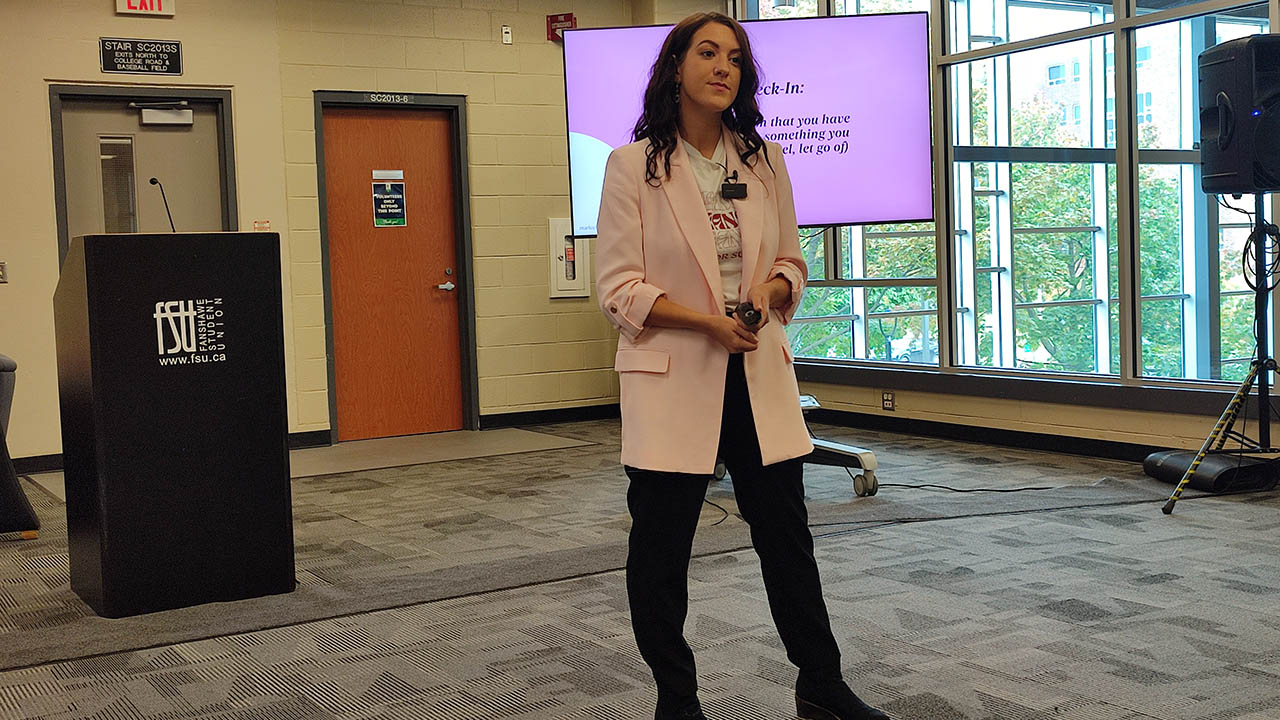Sexual assault survivor Marlee Liss visits Fanshawe
 CREDIT: GRACIA ESPINOSA
CREDIT: GRACIA ESPINOSAMarlee Liss talked at Fanshawe about her experience as a survivor of sexual assault and her experience with restorative justice.
Trigger warning: This story includes specific details pertaining to sexual assault.
On Oct. 19, Fanshawe College hosted speaker, somatic educator, and author Marlee Liss. The Jewish feminist, who identifies as lesbian, made history in North America as the first survivor of sexual assault to participate in a restorative justice process.
Restorative justice means that Liss chose to confront her rapist in an eight-hour circle with the support of her family, her lawyer, Jeff Carolin, and Crown counsel, Cara Sweeny.
This story started in 2016 when Liss was a social work student. She was on the dance team and had just returned from an adventurous summer when she was out partying one night in August.
“I hit that point where I think, ‘OK, I’m tired, I’m drunk, I want to go home.’ I started looking for my friend but didn’t see her. I text her, text her again. Call her; nothing. So, I’m looking around at this point, and this is when this guy comes up to me,” Liss explained in her talk to students at Alumni Lounge.
Liss said the man assisted her in hailing a taxi, revealing that he resided in the same condominium complex as her friend, where she was planning to spend the night. When they arrived, Liss couldn’t find her friend to let her into the unit, so the defendant invited her for a glass of water.
“A moment later, he returns, pulls my pants down, and starts assaulting me. And I quickly say, ‘No, I’m not in the mood,’ you know, thinking of things we learned and [are] supposed to say at that moment. And I realize it’s not working, and it’s this terrifying moment where I’m like, ‘Oh my gosh, my voice is not doing anything.’”
According to Liss, the assault lasted until the sun rose.
When she came out of shock, she took her things and returned home. Liss told her roommate what happened, and they went to the hospital. She subsequently filed a report.
It wasn’t until 2018 that she got a call for a preliminary trial.
After five hours in court, Liss felt that the steps she had taken in her healing were 300 steps back. And she started again to focus on her survival, stating that’s all she really could do.
In 2019, she was subpoenaed for a criminal trial, meaning there was enough evidence to go forward.
Liss was determined to drop the charges because she believed she wouldn’t be able to stop her attacker from doing it again. For that reason, she started seeking another solution.
“When I found restorative justice and saw that it had a lineage that Indigenous-Jewish Mennonite communities had been doing this for thousands of years, that there are so many survivors who share these wounds, that was a deeply validating and affirming thing,” Liss said.
Before convening the justice circle, the offender had undergone months of therapy.
“He turned to me with, like, ‘I feel such a deep, embodied sense of remorse,’ tears in his eyes and heart, and said, ‘I’m sorry I sexually assaulted you. There’s nothing I can do to take it back. And I hope that being here today can help.’ And to some people, they might be like, ‘That’s not enough. Those are just words.’ But I think we’re so trained to turn towards the person and cause harm and try to find adequate punishment. But in doing so, we often neglect the survivor completely.”
After that, Liss dropped the sexual assault charge against her attacker. The experience has led her to devote herself wholeheartedly to sharing her testimony and helping other survivors heal.
“We want to share our stories, certainly not all, and there’s no obligation to. But so many of us have a deep want to. And so much research shows that healing often comes from making meaning of that. So, being able to speak like this. It’s equally healing for me. It’s equally empowering for me.”
After the talk, Liss held a training session for counsellors at Fanshawe. Fanshawe’s sexual violence prevention advisor, Leah Marshall said the type of healing that Liss advocates for is highly beneficial for students at Fanshawe.
“We need to hear directly from survivors about their experiences and the care and healing they’d like to see moving forward. And [Liss] advocates for choice-based services, and that’s what we try to provide,” Marshall said.
Marshall reminded students who have been impacted by gender- based violence and want to know their options to seek professional support through counselling and accessibility services at Fanshawe College.
“We do have survivor support within our office. So, if anyone is curious about their own healing journey and want to connect for support, please contact us at,” Marshall added.














